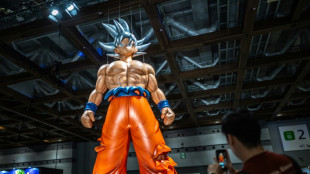
-
 Markets fluctuate as traders weigh geopolitical tensions
Markets fluctuate as traders weigh geopolitical tensions
-
N. Korea's latest weapon? Bombarding South with noise

-
 'Kidnapped' Uganda opposition figure Besigye to appear at military court: lawyer
'Kidnapped' Uganda opposition figure Besigye to appear at military court: lawyer
-
Asian markets fluctuate as traders weigh geopolitical tensions

-
 'An inauspicious day': the landmines ruining Myanmar lives
'An inauspicious day': the landmines ruining Myanmar lives
-
UN to vote again on Gaza ceasefire, US plans unclear

-
 Japan's manga powerhouse 'Dragon Ball' turns 40
Japan's manga powerhouse 'Dragon Ball' turns 40
-
Japanese, Koreans bottom of global love life survey

-
 Son blames 'mistakes' after South Korea held by Palestine in qualifier
Son blames 'mistakes' after South Korea held by Palestine in qualifier
-
Japan ramps up tech ambitions with $65 bn for AI, chips

-
 Lights, action, melodrama! Silent films get new reel at London haven
Lights, action, melodrama! Silent films get new reel at London haven
-
Myanmar led world in landmine victims in 2023: monitor

-
 ICC to sentence Timbuktu war criminal
ICC to sentence Timbuktu war criminal
-
Ugandan opposition figure Besigye 'kidnapped', says wife

-
 Australia's Jason Day eyes more major glory after resurgence
Australia's Jason Day eyes more major glory after resurgence
-
Machu Picchu security boosted after visitors spread human ashes

-
 Popovic hails Australia character in 'crazy' World Cup qualifier
Popovic hails Australia character in 'crazy' World Cup qualifier
-
Taliban govt clearing 'un-Islamic' books from Afghanistan shelves

-
 Argentina beat Peru as Uruguay hold Brazil
Argentina beat Peru as Uruguay hold Brazil
-
Asian markets struggle as traders weigh geopolitical tensions

-
 Tatum stars as Celtics end Cavaliers unbeaten start
Tatum stars as Celtics end Cavaliers unbeaten start
-
Hurting India under pressure in blockbuster five-Test Australia series

-
 'They killed her dream': Israel strike leaves woman footballer in coma
'They killed her dream': Israel strike leaves woman footballer in coma
-
Iraq holds its first census in nearly 40 years

-
 Iraqis face tough homecoming a decade after IS rampage
Iraqis face tough homecoming a decade after IS rampage
-
Russian net tightens around last civilians left in eastern Ukraine

-
 Olympic champion Tebogo aims to inspire next generation of African athletes
Olympic champion Tebogo aims to inspire next generation of African athletes
-
Valencia on target as ten-man Ecuador upset Colombia

-
 'Rust' to premiere three years after on-set shooting
'Rust' to premiere three years after on-set shooting
-
Strike at French cognac maker Hennessy over measures in China spat

-
 Xi, Lula meet in Brasilia to 'enhance ties'
Xi, Lula meet in Brasilia to 'enhance ties'
-
SpaceX fails to repeat Starship booster catch, as Trump watches on

-
 'I have left a legacy': Nadal retires from tennis
'I have left a legacy': Nadal retires from tennis
-
US recognizes Venezuela opposition's Gonzalez Urrutia as 'president-elect'

-
 European powers, US seek to censure Iran at UN nuclear watchdog board
European powers, US seek to censure Iran at UN nuclear watchdog board
-
UNAIDS chief says husband, Ugandan opposition figure Besigye, 'kidnapped'

-
 Nadal's sensational career ends as Netherlands defeat Spain in Davis Cup
Nadal's sensational career ends as Netherlands defeat Spain in Davis Cup
-
US announces talks with Israel over civilian casualties in Gaza

-
 SpaceX fails to repeat Starship booster catch, as Trump looks on
SpaceX fails to repeat Starship booster catch, as Trump looks on
-
G20 summit ends with Ukraine blame game

-
 Trump appoints TV celebrity 'Dr. Oz' to key US health post
Trump appoints TV celebrity 'Dr. Oz' to key US health post
-
European stocks fall on Ukraine-Russia fears, US focused on earnings

-
 Last-gasp Szoboszlai penalty rescues Hungary draw with Germany
Last-gasp Szoboszlai penalty rescues Hungary draw with Germany
-
Germany, Netherlands draw as Nations League group stage ends

-
 Hong Kong tycoon Jimmy Lai takes witness stand in collusion trial
Hong Kong tycoon Jimmy Lai takes witness stand in collusion trial
-
Guardiola set to extend stay as Man City boss - reports

-
 Minnows Botswana hold Egypt to qualify with Mozambique, Tanzania
Minnows Botswana hold Egypt to qualify with Mozambique, Tanzania
-
Inter Miami coach Martino leaving club for 'personal reasons' - club source

-
 Chinese man sentenced to 20 months for Falun Gong harassment in US
Chinese man sentenced to 20 months for Falun Gong harassment in US
-
Hong Kong court jails 45 democracy campaigners, drawing condemnation


Hong Kong's bamboo scaffolders preserve ancient technique
Mo Jia Yu wraps his legs around a pole to balance high above the ground and secure a joint, a skill he must master to become a bamboo scaffolder in Hong Kong.
The metropolis is one of the world's last remaining cities to use bamboo scaffolding in modern construction and building repair.
Scaffolders perched on bamboo frames several storeys high are a common sight, and are nicknamed "spiders" by Hong Kongers for their agility over the web-like latticework.
Mo is among dozens of students who enrol each year at the city's Construction Industry Council (CIC) to learn the traditionalmethod.
"You have to have a daring heart," said Mo, who has been at the school for nearly three months.
"You have to be aware of safety because you are working high up in the air."
Students learn how to firmly saddle the bamboo frame so that they can free up their hands to work on the scaffolds, which are held together with simple knots tied using nylon strips.
"This basic knot is something we learn first... we practise for an entire week to get it right," said another student, Ho Cheuk Wai.
"Then, the instructors will teach us how to put on the safety harness, and step-by-step we learn how to build all the way to the top."
Scaffolding using bamboo dates back centuries and was once a widespread practice across China and elsewhere in Asia.
Most cities in the region have phased it out to favour materials such as steel and aluminium.
In Hong Kong, intricate bamboo webs are still part of the cityscape, latticed around both old residential flats and glitzy skyscrapers.
- 'Courage and skill' -
Scaffolding is regulated by strict safety guidelines but is still viewed as a dangerous profession since the work is often done at dizzying heights.
"You need courage as well as skill to survive," said Wallace Chang, a professor at Hong Kong University's architecture department.
"This deters people from going into the industry."
Despite the perils involved in the craft, Chang hopes Hong Kong will preserve it as part of its cultural heritage.
Its popularity in the city is due to both price and efficiency.
Bamboo is readily available across the border in southern Chinese provinces. A pole costs around HK$15 (US$2) compared with HK$280 (US$35) for one made of metal.
Lightweight bamboo is also easier to transport through a cramped urban centre.
It is flexible, allowing builders to cut poles to desired lengths for different construction sites.
"Bamboo scaffolds are very suited to the odd and tight spaces in Hong Kong," explained instructor Kin Kee Wo, who has worked in the construction industry for nearly 30 years.
"It can be built in the most unthinkable places, in the most beautiful ways."
M.O.Allen--AT

